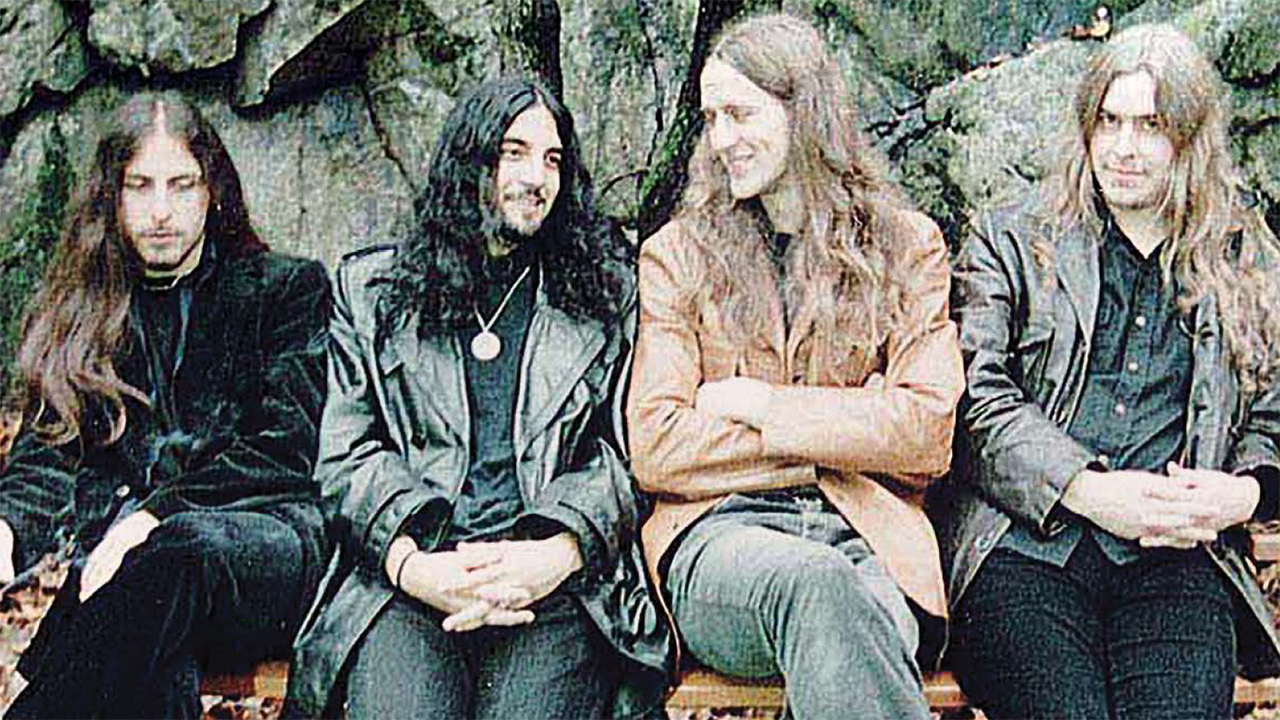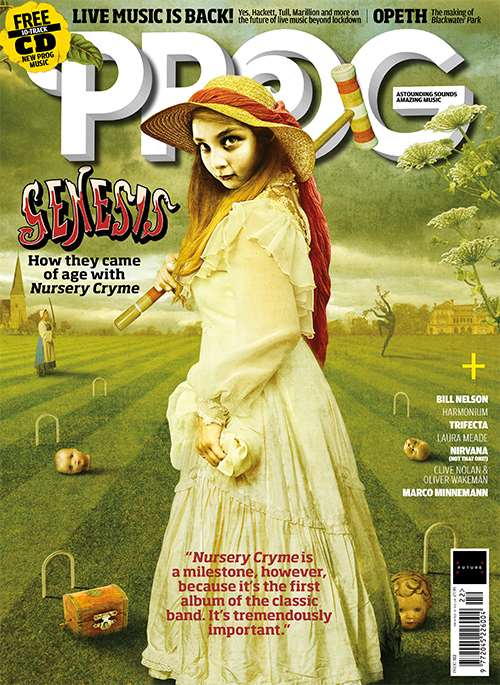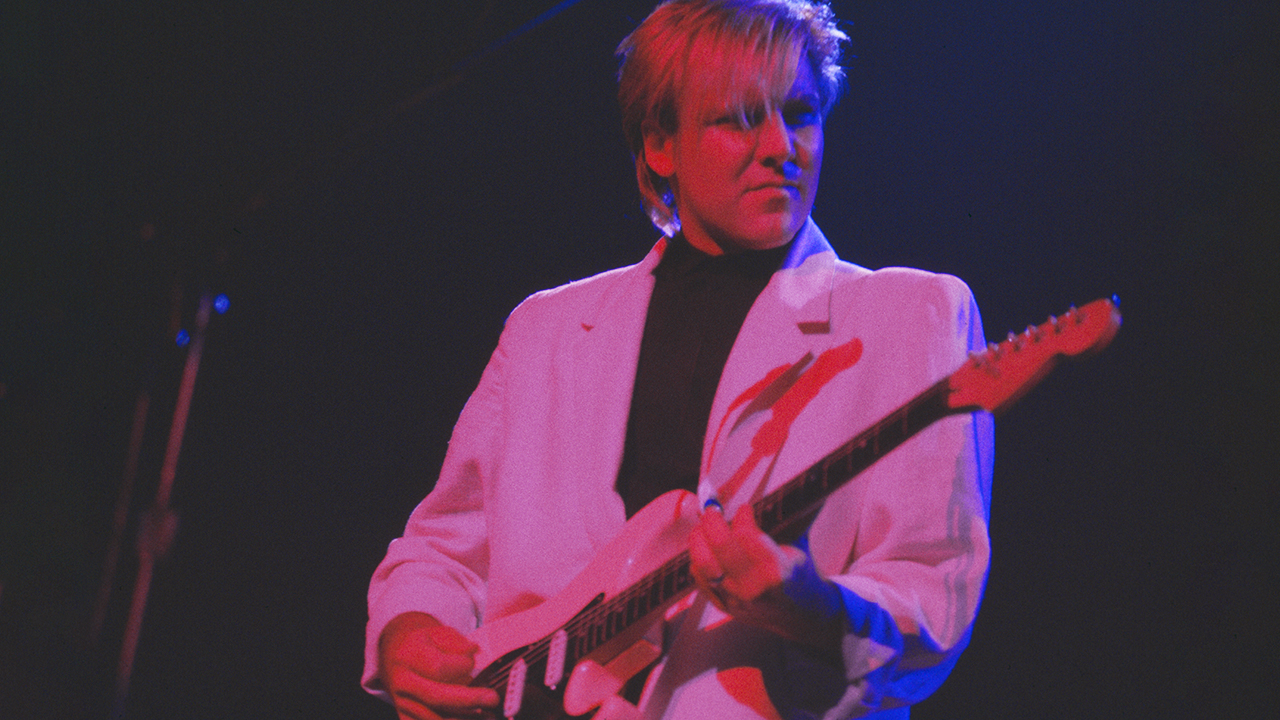“It’s a really good album, but I’m not sure it’s better than the ones that came before. You ask, ‘Why didn’t this happen sooner?’” Many consider Blackwater Park to be Opeth’s masterpiece. Opeth don’t
The classic line-up had assembled, Steven Wilson was contributing and Mikael Åkerfeldt was mining songwriting gold – but you can’t convince him the 2001 release was their magnum opus

Opeth were maligned in the Swedish metal scene... then 2001 album Blackwater Park made them heroes of progressive music. Singer, guitarist and principal songwriter Mikael Åkerfeldt told Prog the story behind the music in 2021.
“Godlike.” “As perfect as a metal album can get.” “Metal’s answer to 70s King Crimson.” These were some of the phrases thrown around in the music press when Opeth released Blackwater Park in 2001. The fifth, breakthrough album by Sweden’s progressive metal outcasts, it earned them the status of worldwide rock’n’roll heroes – a reputation they still enjoy today.
Doors were broken down by the album’s corpus of 10-minute giants The Drapery Falls and The Leper Affinity, which were experimental without compromising on melody or groove. While prog loyalists swooned at the unorthodox chord changes and technical guitar licks, metalheads could headbang until their necks were sore thanks to the simplified rhythms.
Then they could scream their lungs out alongside Mikael Åkerfeldt’s seething roars. Elsewhere, classic rock fans could get lost in the heartfelt choruses, sung gorgeously with the help of producer Steven Wilson, and the acoustic tenderness of Harvest. It was music for both the head and the heart, uniting the rock world in adoration for one fleeting moment.
Twenty years later, many people still consider Blackwater Park to be Opeth’s masterpiece. However, those people don’t include Opeth.
“Quite honestly, it’s a really good album, but I’m not sure it’s better than the ones that came before it,” the stoic Åkerfeldt says. “Of course, you can’t help but ask yourself, ‘Why didn’t this happen on [preceding album] Still Life?’ Or maybe even the one before that? I’d been waiting for any type of attention for this band; and it happened with Blackwater Park.”
Although he’s proud of his band’s acclaimed opus, he’s quick to attribute its groundbreaking success to the business that was whirring away behind it, more than the music itself. For starters, Blackwater Park was Opeth’s first record with Music For Nations. Following their blink-and-you’ll-miss-it residency at Peaceville Records, it was released by the large specialist label whose roster included, at various points, Metallica, Tool, Frank Zappa, Poison, W.A.S.P. and Slayer. “We got management and we got an agent as well,” Åkerfeldt adds. “We got a lot of help to reach out to a lot of people with that album.”
Sign up below to get the latest from Prog, plus exclusive special offers, direct to your inbox!
Blackwater Park also heralded the second tour – and their first world tour – of Opeth’s then-decade-long history. Beforehand, their sole stint on the road was under Cradle Of Filth in 1996. Now, with the music business machine behind them, they were touring the US with Nevermore and Amorphis, selling CDs at every stop along the way.
“We went down so well supporting Nevermore that we were booked on a headlining tour straight after,” remembers Åkerfeldt. “I could tell that there was a hunger for our band. The European tour, same thing there; we were popular. Since Blackwater Park, we’ve toured a lot. It’s certainly helped to get people to pay attention to us.”
Some people find it hard to understand that we were writing Still Life and listening to Stevie Wonder
In the aftermath of Blackwater Park, they had it all: industry support, worldwide goodwill, a prosperous live schedule – all things any musician would rightfully kill for. It was a stark reversal of fortune compared to where the band had stood before the album’s release. “We had a bad reputation,” says Åkerfeldt. “We were so unknown that, if you’d heard of us, you’d been told that we were shit.”
Original vocalist David Isberg founded Opeth in 1989 in Stockholm. Initially they were a death metal band, peddling incessant heaviness during the height of the city’s fascination with the genre; local acts Entombed and Dismember were the hottest things in the underground at the time. Isberg brought Åkerfeldt into the fold as bassist the following year – without consulting the existing bassist. An internal squabble ensued, during which Isberg fired every member bar Åkerfeldt. Despite wrangling a new line-up, things only worsened when they played their first concert together.
“It was shit,” says Åkerfeldt. “It was a complete farce. Our drummer, Anders Nordin, couldn’t remember the songs. I had to stand with my back to the audience to wave to him, saying, ‘There’s a transition coming up!’ People threw chewing tobacco in David’s face during the show and they stole the microphone stand from him. He was running around in the audience, trying to catch the guy who stole his microphone. To this day, I’m blushing because it’s very embarrassing.”
Isberg left in 1992, allowing Åkerfeldt to take the reins as lead singer and rhythm guitarist. Inspired as much by Deep Purple and Pink Floyd as he was by Morbid Angel, he steered the band in a more progressive direction. He composed In Mist She Was Standing and The Twilight Is My Robe – suites that, Åkerfeldt’s hoarse screams notwithstanding, bore minimal resemblance to death metal. They boasted galloping, complex melodies à la Iron Maiden, which frequently gave way to acoustic guitar segues and jazz-like bass solos.
In 1994, the band holed up with Dan Swanö – leader of the rowdy yet avant-garde Edge Of Sanity – in Unisound Studios to record their debut album, Orchid. However, their unenviable reputation persisted. “A death metal band called Unanimated went to Unisound to record right after we finished Orchid,” recalls Åkerfeldt. “Dan called me up, saying, ‘They asked me what the last thing I produced was. I went, ‘It was Opeth,’ and they said, ‘Opeth? They’re shit!’”
Åkerfeldt continues: “But then they played the album. They had to have a band meeting, asking, ‘What are we gonna do now?’, because they thought it was so good.”
A Blackwater Park-sounding record today would sound old hat. I don’t think it would be exciting to anyone
The album marked the commencement of Opeth’s campaign to win over the Swedish scene. “I always carried a cassette of Orchid in my jacket,” Åkerfeldt says, “so, wherever I went, I put it on, like a fucking geek. I put it on in backstage dressing rooms to get people to go, ‘What’s this?!’ I was so proud. I really wanted to start a new reputation – one that was good, instead of being a joke.”
That desire to wow made 1996 follow-up Morningrise even more progressive, to the point where Åkerfeldt today lambasts it as self-indulgent: “It’s a bit pretentious; then again, we’re kind of a pretentious band! But I’d prefer if that pretentiousness wasn’t audible. Morningrise is more sophisticated than Orchid, but it’s also pseudo-intellectual.”
Their third album, 1998’s My Arms, Your Hearse, took some much-needed backward steps, setting the stage for the band’s coming-of-age release. Still Life was new ground for Opeth in many ways. Not only was it their debut on Peaceville (one-time home to Katatonia and Anathema); it was the first album from the ‘classic’ line-up of Mikael Åkerfeldt, drummer Martín López, guitarist Peter Lindgren and bassist Martín Méndez, which would last until 2005. “We were tight,” Åkerfeldt recalls of the four-piece. “We were almost brothers, you could say.”
The album also drew from new influences. “I had been reaching out from just collecting prog records to jazz and soul,” says Åkerfeldt. “Some people find it hard to understand that we were writing Still Life and listening to Stevie Wonder. Still Life was really important for me. I knew what I wanted to do, and that music was exactly what I wanted to do. That feeling continued on Blackwater Park. It was like finding a gold mine: you find gold, you continue hacking away and then there’s more!”
Despite signing a five-album deal, Still Life would be Opeth’s only release through Peaceville. After listening to the band, the imprint’s distributor, Music For Nations, added them to their own roster. “Andy Black, who ran Music For Nations, was so desperate to have Opeth that he threatened to cancel the entire distribution deal if he didn’t get us,” remembers Åkerfeldt.
Buoyed by their camaraderie, musical maturation and new label, the band quickly journeyed to Studio Fredman in Gothenberg to make Blackwater Park. However, although he’d worked on both My Arms… and Still Life, they began struggling with producer Fredrik Nordström’s hands-off approach – as well as the other ways the studio made money.

“Technically, Fredrik wasn’t even there,” Åkerfeldt states. “He’d set up a great sound on the drums, guitars and bass, and then piss off. You could be interrupted in the middle of a recording by 10 women storming in because there’s a bridal shower and they’re gonna record a funny song, drunk. Sometimes bands that rented the studio had to wait in the toilet for three hours.”
As a result, after tracking drums, bass and guitars by themselves, Opeth brought in Steven Wilson to oversee the vocals. They’d previously caught the Porcupine Tree leader’s attention when a French journalist had given him Åkerfeldt’s email address and a copy of Still Life. When Wilson reached out to the frontman, he declared the album as containing the best metal he’d ever heard.
Wilson’s passion led to his role in Blackwater Park growing over time. What were initially simple co-production duties soon evolved into him composing new harmonies and, most notably, singing the alluring chorus of the second song, Bleak.
“When we brought in Steven, Fredrik felt challenged,” says Åkerfeldt. “All of a sudden, it’s gonna say on the record, ‘Co-produced by someone else.’ And Steven is a down-to-earth, friendly, calm guy, and Fredrik is a bit loud. I remember him giving Steven a hard time.” The tension between the two resurfaced during post-production. “Steven mixed the stuff that he recorded. I remember him being nervous that, if Fredrik mixed what me and Steven had worked on, Fredrik would fuck it up.”
Nonetheless, when Blackwater Park saw the light of day on March 12, 2001, it was received as Opeth’s crowning achievement. The planets aligned: the powers that be amassed behind the band at their artistic peak.
Twenty years later, still road warriors adhering to the touring schedule Blackwater Park introduced, Opeth no longer make metal. Bored of the limits of the genre, they’ve completed the journey to prog rock they began in the 90s. Still, even if they don’t think it’s quite worth the hype, they’ll always embrace their fifth full-length as a stirring moment in time.
“If we were to put out Blackwater Park now, I don’t think people would love it,” Åkerfeldt says. “A Blackwater Park-sounding record today would sound old hat. I don’t think it would be exciting to anyone. Specific records come out at a specific time and they mean a hell of a lot to people. Then the magic is gone.”

Louder’s resident Gojira obsessive was still at uni when he joined the team in 2017. Since then, Matt’s become a regular in Metal Hammer and Prog, at his happiest when interviewing the most forward-thinking artists heavy music can muster. He’s got bylines in The Guardian, The Telegraph, The Independent, NME and many others, too. When he’s not writing, you’ll probably find him skydiving, scuba diving or coasteering.





